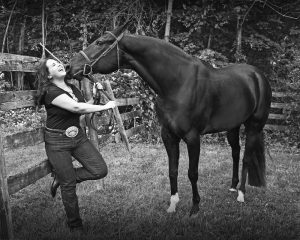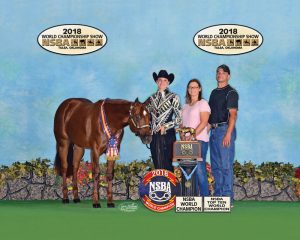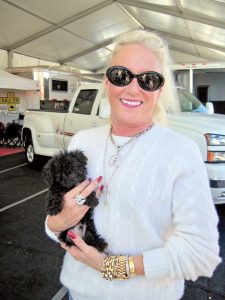Safe and Sound – Tips for Keeping Your Items Safe at the Congress
Click here to read the complete article
136 – October 2019
 By Delores Kuhlwein
By Delores Kuhlwein
Crime can happen anywhere. It can even happen at horse shows, especially the upscale kind, which have been a target for thieves for a long time. Unfortunately, the atmosphere of a horse show makes it an appealing target for thieves with the presence of expensive tack, busy and distracted exhibitors, and an atmosphere of community and trust.
The Quarter Horse Congress, the biggest horse show of the year, is the largest convention of any kind in the state of Ohio, and it’s held in the bustling metropolitan city of Columbus which makes it ripe for various crimes as evidenced by news headlines every year. Stories from exhibitors and vendors range from vehicles being broken into, to items being stolen from the show grounds, to people getting robbed in parking lots.
However, law enforcement experts say there’s no reason for horse show enthusiasts to lose their sense of enjoyment when they are at the show. Changing some simple habits regarding where to stay, dine, and park can serve exhibitors well during their time at the Congress. Read on for tips from experts and exhibitors to make spending time at the Congress, and any other show, feel safe and secure.
Lock It Up
It seems like common sense, but when surrounded by hundreds of friends and acquaintances, it’s easy to become complacent about belongings, so securing them just needs to become habit. Locking stalls when you leave, even for a short errand, is key, as is chaining up bicycles, scooters, and golf carts.
When it comes to the Congress, people get caught up in the competition and let their guard down, explains Ronnie Casper of Ocala, Florida, who owns Hannah Fine Jewelry with his wife. Ronnie and Hannah have presented their wares at almost every Congress since 1977, and he says safeguarding your valuables should be on everyone’s priority list, whether it’s tack, jewelry, or any other belongings.
 “The majority of those attending the show are honest and look out for each other, but Congress is in a part of Columbus that’s a high crime area,” he says. “Although they do the best they can with security, people need to be aware of where they are. The show is in a large city where crime is more prevalent.”
“The majority of those attending the show are honest and look out for each other, but Congress is in a part of Columbus that’s a high crime area,” he says. “Although they do the best they can with security, people need to be aware of where they are. The show is in a large city where crime is more prevalent.”
He should know, since he and his wife, Hannah, fell victim to theft one year at the show. Casper recalls, “I wasn’t there yet, but Hannah arrived early with others to get the booth and stalls set up. They had a guy come into the booth, and he grabbed her purse and ran! A couple other vendors chased the thief, caught him, and secured him until the police arrived. She was able to get her purse back, but it’s a reminder that we’re all vulnerable in our everyday lives, even more so when there’s a big congregation of high-end material items.”
In addition to locking up valuables, such as purses, tack and scooters, longtime Congress exhibitor Paige Merrill of Hinckley, Ohio, says it’s very common for exhibitors to use surveillance in tack stalls as an extra layer of protection. “People are using video cameras and companies like Stall Watch©,” she explains. Along with Stall Watch©, many exhibitors love the flexibility of Blink©, a camera system that’s battery-operated, affordable, and has no hidden subscription fees or data storage charges. Not only can exhibitors monitor their tack and horse stalls from their smartphones; but, if the unthinkable does happen, they may capture a recording of the incident.
Location, Location, Location
Besides being diligent about keeping any eye on belongings when on the show grounds, planning ahead regarding where to stay, dine, park, or even walk can pay off in spades.
Lodging and Dining
Many exhibitors and attendees prefer to get away from it all by staying in outlying areas, such as Easton and Polaris, both recommended by Judge Daren Wright of Chillicothe, Ohio. “Easton has a ton of shopping and dining,” he says. “They also have lots of great restaurants, too.”
All-around exhibitors Kathryn Devries Mitchell of Vacaville, California, and Kathy Tobin of Paradise Valley, Arizona, agree that Polaris is a top choice, and Mitchell also has stayed in hotels by the airport. AQHA breeder Beth Mallett of Sierra Vista, Arizona, has frequented hotels near the airport, and she plans on staying in the Polaris area this year. “I was told to stay away from Morse Road and the 161 area, so I have,” she says.
Joan Ames of La Porte, Indiana, is an APHA exhibitor who accompanies her husband’s training barn to the Congress each year. She prefers to stay in Worthington off the Highway 23 exit, about 15 minutes from the show grounds. She says, “There are multiple hotels and restaurants in the area. It has easy access, and it’s safe.”
For Scottsdale, Arizona resident Ruth Kaplan, who hails from Ohio, showing her horse multiple times at the Congress has allowed her a different approach to staying safe. “For personal safety, I feel better staying on the grounds rather than walking in the dark at night,” she explains. “It’s harder to find your car, because the facility is so huge. Not everyone wants to pay to stay there, but I think it’s worth it,” she says.
Additionally, she dines on the grounds because she’s discovered that the best food comes from Mai Li’s, who has been a food vendor there for years. Kaplan says, “You know the food is be-ing made fresh, because she’ll stir fry it right in front of you. If you’re gluten free or vegetarian, she’ll make it special.”
 Parking Cautions
Parking Cautions
Choosing where to park is another important decision, says Kaplan, who explains that she’s never had an incident by leaving things in her vehicle. “Never buy the day pass. If you think you’re going to attend at least twice, buy the full parking pass and then you can park on the grounds as opposed to across the street,” she advises. “You won’t have to walk a bazillion miles and, if you do any shopping, you won’t have to drag your things across 17th Avenue.”
All-around trainer Alex Bradley Whalen of Chino Hills, California, experienced a break-in while parked as close to the lobby of his hotel as possible. He was also parked under a light for extra security. “On the very last day of the show, I had two brand new Shorty’s hats stolen out of my rental car in the front parking of the hotel. They broke into over 25 cars in the hotel parking lot and shattered all the windows,” he says. “It’s always worth it to pay the extra money for insurance on a rental car to cover your items left in the car,” he recommends.
Horse Show veteran Gerri Leigh Pratt of Winston-Salem, North Carolina, was parked two spots from the door of the Fish House for a nice meal when the unexpected happened. She says, “My tiny, two-and-a-half-pound poodles were in the car. One of the poodles was in the shoulder bag I normally carry, and one was out of the bag. They took the bag and my phone.” Although the restaurant had cameras, police couldn’t get a license number. “It was horrible. My advice would be that when you go to a restaurant, take your small dogs in a backpack with you. I could’ve taken mine and still had them both.”
Pratt feels the most prominent security problem that might need changing is the stickers that get placed on cars that identify them as belonging to Congress exhibitors. “They know that if you have a horse, you have some money. Nine times out of ten, it’s like a neon sign that the car has valuables in it.”
Speaking of vehicles, the Columbus Division of Police offers a guide to personal safety and parking lot conduct is a highlighted topic. Carrying yourself with confidence and staying alert using sight, hearing, and smell are advised, along with the following safety recommendations:
• Park in well-lighted areas. Make sure you lock your car door(s) at all times. Do not leave valuables inside your car. Lock them in the trunk. Have your keys ready in-hand and when approaching your car. Be aware of what’s going on around you, like people near your car or you, etc. If you’re threatened, yell “Help,” “Fire,” or anything to draw attention.
• Do not overload yourself with packages or bundles. Lessen the time it takes you to get into your car. Carry only the items you need in your purse and carry your purse under your coat or close to your body. Don’t leave your purse lying around. Consider wearing a belt bag or fanny pack. Purse snatching, the most frequent, is usually a hit-and-run operation in which speed is of the essence. Most purse-snatchers are fleet-footed teenagers who take advantage of an opportunity. By carrying your purse under your coat or close to your body (not dangling from your hand or arm), you already lessen the risk.
Respect Yourself
Personal safety, especially when you’re carrying possessions, needs to be a focus anywhere you are, but particularly when you’re a tourist.
Renowned travel host Rick Steves says to remember that thieves generally target vacationers. “It’s not because they’re mean, but because they’re smart,” he explains in his web article, Outsmarting Pickpockets and Thieves. “We’re the ones with all the good stuff in our bags and wallets. We’re loaded down with valuables and bumbling around in a strange new environment. We stick out like jeweled thumbs.”
Fortunately, the Ohio Highway Patrol has a training center right at the entrance to the Congress and a patrol office in one of the barns. “They do walk around and have a presence on the fairgrounds,” explains Paige Merrill. Regardless, she keeps her daughter, Morgan, close at all times, and carries mace in her pocket while staying alert.
“Just be vigilant,” Pratt says, who has curtailed her jewelry wearing and avoids the stairwells when going to the upper parking deck at night.
Likewise, the Columbus Division of Police advises any citizen to pay attention and walk with confidence in their personal safety guide:
 “Don’t appear to be a willing target. Always be aware of what’s going on around you. Do you know where your neighborhood police and fire stations are located? These are places you may wish to go in case of an emergency. If you go out for late night snacks, movies, or errands, avoid going by yourself. Most assaults happen to a lone victim. Let someone know where you’re going and when you will return. Call if you’re going to be late. Prevention is always the key to living safer.”
“Don’t appear to be a willing target. Always be aware of what’s going on around you. Do you know where your neighborhood police and fire stations are located? These are places you may wish to go in case of an emergency. If you go out for late night snacks, movies, or errands, avoid going by yourself. Most assaults happen to a lone victim. Let someone know where you’re going and when you will return. Call if you’re going to be late. Prevention is always the key to living safer.”
Steves says not to travel fearfully, but to travel carefully and “exercise adequate discretion, stay aware of your belongings, and avoid putting yourself into risky situations (such as unlit, deserted areas at night).”
He suggests the following behaviors to lessen your risk:
• Leave valuables in your hotel room. Theft from hotel rooms happens, of course, but it’s relatively rare. Hoteliers are quick to squelch a pattern of theft.
• Secure your bag, gadgets, and other valuables when you’re out and about. Thieves want to quickly separate you from your valuables, so even a minor obstacle can be an effective deterrent. If you’re sitting down to eat or rest, loop your daypack strap around your arm, leg, or chair leg.
Put it in Writing
If the unthinkable still happens, City of Glendale, Arizona Police Officer Bill Johnston says you can feel more secure by having proper records, photos, and details of your property, especially with tack and other high-dollar valuables.
“What assists law enforcement are any unique marks that are easily identifiable, such as a torn fender on a saddle. Specific photos or video of the items and an inventory list is very helpful,” the 26-year veteran officer explains. “We also must know the manufacturer, model number, the serial number, and where the owner-applied number is located, if the owner has applied one.”
What is an owner-applied number? “The idea of an owner-applied number is to make a number as personal to you as possible and record it,” explains APHA Amateur Cassie Gaarder, a Police Communications Specialist of 21 years for the City of Glendale, Arizona. She suggests stamping or engraving your own personalized owner-applied number, such as your phone number, directly on expensive tack and other items of value.
This type of documentation is important for the National Crime Information Center (NCIC) database, part of the FBI repository on files involving persons or property. The NCIC is a commonly-known tool for law enforcement to track stolen guns, vehicles, electronics, and other valuables that may make their way to places like pawn shops for resale. “Any law enforcement agency has access to this database nationwide 24/7,” Johnston explains. To have a stolen item recorded into this database, the property value must exceed $5,000 total. If the total value of a theft doesn’t meet the $5,000, but one single item has a value of $500 or more and it has a unique manufacturer-assigned serial number or an owner-applied number, it can be entered into the system.
If It Happens
Officer Johnston also advises exhibitors to file a report as soon as possible if a theft has occurred. “Time is of the essence. Criminals are crafty when it comes to making a buck, and they know that,” he reveals.
In addition, both Officer Johnston and Police Specialist Gaarder recommend following up. “If the police report meets the qualifications as stated by the NCIC guidelines, the agency should follow protocol and enter the stolen items into the database. However, it doesn’t hurt to ask and do follow-up with the officer and/or detective that’s assigned by asking, ‘Were my items entered into the NCIC database?’ You’re the victim, so the system should be working for you.”
All in all, Steves suggests, in his article, to keep material losses in perspective. “Many tourists get indignant when pickpocketed or ripped off. If it happens to you, it’s best to get over it. You’re well off enough to travel and thieves aren’t. If a thief has robbed you of your belongings, don’t let them rob you any further by allowing the loss to ruin your entire trip.”










